2015考研英语:完型真题内容浅析
2015年考研英语一真题及答案详细解析
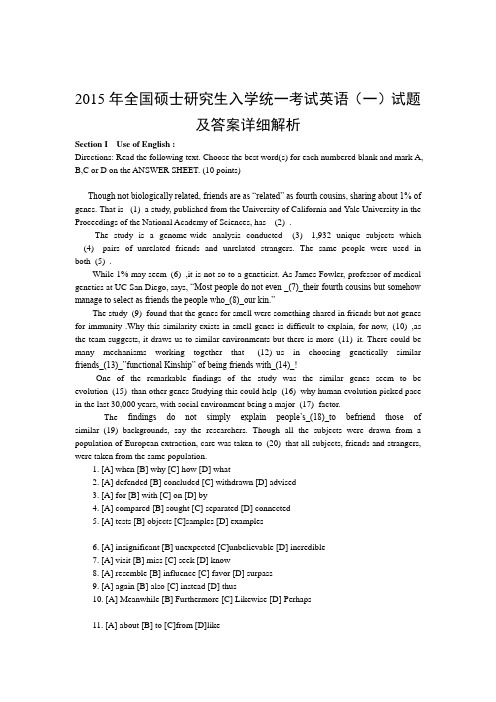
2015年全国硕士研究生入学统一考试英语(一)试题及答案详细解析Section I Use of English :Directions: Read the following text. Choose the best word(s) for each numbered blank and mark A, B,C or D on the ANSWER SHEET. (10 points)Though not biologically related, friends are as “related” as fourth cousins, sharing about 1% of genes. That is _(1)_a study, published from the University of California and Yale University in the Proceedings of the National Academy of Sciences, has__(2)_.The study is a genome-wide analysis conducted _(3)__1,932 unique subjects which __(4)__pairs of unrelated friends and unrelated strangers. The same people were used in both_(5)_.While 1% may seem_(6)_,it is not so to a geneticist. As James Fowler, professor of medical genetics at UC San Diego, says, “Most people do not even _(7)_their fourth cousins but somehow manage to select as friends the people who_(8)_our kin.”The study_(9)_found that the genes for smell were something shared in friends but not genes for immunity .Why this similarity exists in smell genes is difficult to explain, for now,_(10)_,as the team suggests, it draws us to similar environments but there is more_(11)_it. There could be many mechanisms working together that _(12)_us in choosing genetically similar friends_(13)_”functional Kinship” of being friends with_(14)_!One of the remarkable findings of the study was the similar genes seem to be evolution_(15)_than other genes Studying this could help_(16)_why human evolution picked pace in the last 30,000 years, with social environment being a major_(17)_factor.The findings do not simply explain people’s_(18)_to befriend those of similar_(19)_backgrounds, say the researchers. Though all the subjects were drawn from a population of European extraction, care was taken to_(20)_that all subjects, friends and strangers, were taken from the same population.1. [A] when [B] why [C] how [D] what2. [A] defended [B] concluded [C] withdrawn [D] advised3. [A] for [B] with [C] on [D] by4. [A] compared [B] sought [C] separated [D] connected5. [A] tests [B] objects [C]samples [D] examples6. [A] insignificant [B] unexpected [C]unbelievable [D] incredible7. [A] visit [B] miss [C] seek [D] know8. [A] resemble [B] influence [C] favor [D] surpass9. [A] again [B] also [C] instead [D] thus10. [A] Meanwhile [B] Furthermore [C] Likewise [D] Perhaps11. [A] about [B] to [C]from [D]like12. [A] drive [B] observe [C] confuse [D]limit13. [A] according to [B] rather than [C] regardless of [D] along with14. [A] chances [B]responses [C]missions [D]benefits15. [A] later [B]slower [C] faster [D] earlier16. [A]forecast [B]remember [C]understand [D]express17. [A] unpredictable [B]contributory [C] controllable [D] disruptive18. [A] endeavor [B]decision [C]arrangement [D] tendency19. [A] political [B] religious [C] ethnic [D] economic20. [A] see [B] show [C] prove [D] tellSection II Reading ComprehensionPart ADirections:Read the following four texts. Answer the questions below each text by choosing A, B, C or D. Mark your answers on ANSWER SHEET. (40 points)Text 1King Juan Carlos of Spain once insisted “kings don’t abdicate, they dare in their sleep.” But embarrassing scandals and the popularity of the republican left in the recent Euro-elections have forced him to eat his words and stand down. So, does the Spanish crisis suggest that monarchy is seeing its last days? Does that mean the writing is on the wall for all European royals, with their magnificent uniforms and majestic lifestyle?The Spanish case provides arguments both for and against monarchy. When public opinion is particularly polarised, as it was following the end of the Franco regime, monarchs can rise above “mere” politics and “embody” a spirit of national unity.It is t his apparent transcendence of politics that explains monarchs’ continuing popularity polarized. And also, the Middle East excepted, Europe is the most monarch-infested region in the world, with 10 kingdoms (not counting Vatican City and Andorra). But unlike their absolutist counterparts in the Gulf and Asia, most royal families have survived because they allow voters to avoid the difficult search for a non-controversial but respected public figure.Even so, kings and queens undoubtedly have a downside. Symbolic of national unity as they claim to be, their very history—and sometimes the way they behave today –embodies outdated and indefensible privileges and inequalities. At a time when Thomas Piketty and other economists are warning of rising inequality and the increasing power of inherited wealth, it is bizarre that wealthy aristocratic families should still be the symbolic heart of modern democratic states.The most successful monarchies strive to abandon or hide their old aristocratic ways. Princes and princesses have day-jobs and ride bicycles, not horses (or helicopters). Even so, these are wealthy families who party with the international 1%, and media intrusiveness makes it increasingly difficult to maintain the right image.While Europe’s monarchies will no doubt be smart enough to survive for some time to come, it is the British royals who have most to fear from the Spanish example.It is only the Queen who has preserved the monarchy’s reputation with her ratherordinary (if well-heeled) granny style. The danger will come with Charles, who has both an expensive taste of lifestyle and a pretty hierarchical view of the world. He has failed to understand that monarchies have largely survived because they provide a service – as non-controversial and non-political heads of state. Charles ought to know that as English history shows, it is kings, not republicans, who are the monarchy’s worst enemies.21. According to the first two Paragraphs, King Juan Carlos of Spain[A] used turn enjoy high public support[B] was unpopular among European royals[C] cased his relationship with his rivals[D]ended his reign in embarrassment22. Monarchs are kept as heads of state in Europe mostly[A] owing to their undoubted and respectable status[B] to achieve a balance between tradition and reality[C] to give voter more public figures to look up to[D]due to their everlasting political embodiment23. Which of the following is shown to be odd, according to Paragraph 4?[A] Aristocrats’ excessive reliance on inherited wealth[B] The role of the nobility in modern democracies[C] The simple lifestyle of the aristocratic families[D]The nobi lity’s adherence to their privileges24. The British royals “have most to fear” because Charles[A] takes a rough line on political issues[B] fails to change his lifestyle as advised[C] takes republicans as his potential allies[D] fails to adapt himself to his future role25. Which of the following is the best title of the text?[A] Carlos, Glory and Disgrace Combined[B] Charles, Anxious to Succeed to the Throne[C] Carlos, a Lesson for All European Monarchs[D]Charles, Slow to React to the Coming ThreatsText 2Just how much does the Constitution protect your digital data? The Supreme Court will now consider whether police can search the contents of a mobile phone without a warrant if the phone is on or around a person during an arrest.California has asked the justices to refrain from a sweeping ruling particularly one that upsets the old assumption that authorities may search through the possessions of suspects at the time of their arrest. It is hard, the state argues, for judges to assess the implications of new and rapidly changing technologies.The court would be recklessly modest if it followed California’s advice. Enough of the implications are discernable, even obvious, so that the justices can and should provide updated guidelines to police, lawyers and defendants.They should start by discarding California’s lame argument that exploring the contentsof a smart phone — a vast storehouse of digital information — is similar to, say, rifling through a suspect’s purse. The court has ruled that police don’t violate the Fourth Amendment when they sift through the wallet or pocketbook of an arrestee without a warrant. But exploring one’s smart phone is more like entering his or her home. A smart phone may contain an arrestee’s reading history, financial history, medical history and comprehensive records of recent correspondence. The development of “cloud computing,” meanwhile, has made that exploration so much the easier.Americans should take steps to protect their digital privacy. But keeping sensitive information on these devices is increasingly a requirement of normal life. Citizens still have a right to expect private documents to remain private and protected by the Constitution’s prohibition on unreasonable searches.As so often is the case, stating that principle doesn’t ease the challenge of line-drawing. In many cases, it would not be overly onerous for authorities to obtain a warrant to search through phone contents. They could still invalidate Fourth Amendment protections when facing severe, urgent circumstances, and they could take reasonable measures to ensure that phone data are not erased or altered while a warrant is pending. The court, though, may want to allow room for police to cite situations where they are entitled to more freedom.But the justices should not swallow California’s argument whole. New, disruptive technology sometimes demands novel applications of the Constitution’s protections. Orin Kerr, a law professor, compares the explosion and accessibility of digital information in the 21st century with the establishment of automobile use as a virtual necessity of life in the 20th: The justices had to specify novel rules for the new personal domain of the passenger car then; they must sort out how the Fourth Amendment applies to digital information now.26. The Supreme Court will work out whether, during an arrest, it is legitimate to[A] prevent suspects from deleting their phone contents.[B] search for suspects’ mobile phones without a warrant.[C] check suspects’ phone contents without being a uthorized.[D]prohibit suspects from using their mobile phones.27. The author’s attitude toward California’s argument is one of[A] disapproval.[B] indifference.[C] tolerance.[D]cautiousness.28. The author believes that exploring one’s p hone contents is comparable to[A] getting into one’s residence.[B] handling one’s historical records.[C] scanning one’s correspondences.[D] going through one’s wallet.29. In Paragraph 5 and 6, the author shows his concern that[A] principles are hard to be clearly expressed.[B] the court is giving police less room for action.[C] citizens’ privacy is not effectively protected.[D] phones are used to store sensitive information.30. Orin Kerr’s comparison is quoted to indicate that[A] the Constitution should be implemented flexibly.[B] new technology requires reinterpretation of the Constitution.[C]California’s argument violates principles of the Constitution.[D]principles of the Constitution should never be alteredText 3The journal Science is adding an extra round of statistical checks to its peer-review process, editor-in-chief Marcia McNutt announced today. The policy follows similar efforts from other journals, after widespread concern that basic mistakes in data analysis are contributing to the irreproducibility of many published research findings.“Readers must have confidence in the conclusions published in our journal,” writes McNutt in an editorial. Working with the American Statistical Association, the journal has appointed seven experts to a statistics board of reviewing editors(SBoRE). Manuscript will be flagged up for additional scrutiny by the journal’s internal editors, or by its existing Board of Reviewing Editors or by outside peer reviewers. The SBoRE panel will then find external statisticians to review these manuscripts.Asked whether any particular papers had impelled the change, McNutt said: “The creation of the ‘statistics board’ was motivated by concerns broadly with the application of statistics and data analysis in scientific research and is part of Science’s overa ll drive to increase reproducibility in the research we publish.”Giovanni Parmigiani, a biostatistician at the Harvard School of Public Health, a member of the SBoRE group. He says he expects the board to “play primarily an advisory role.” He agreed to join because he “found the foresight behind the establishment of the SBoRE to be novel, unique and likely to have a lasting impact. This impact will not only be through the publications in Science itself, but hopefully through a larger group of publishing places that may want to model their approach after Science.”John Ioannidis, a physician who studies research methodology, says that the policy is “a most welcome step forward” and “long overdue.” “Most journals are weak in statistical review, and this damages the quality of what they publish. I think that, for the majority of scientific papers nowadays, statistical review is more essential than expert review,” he says. But he noted that biomedical journals such as Annals of Internal Medicine, the Journal of the American Medical Association and The Lancet pay strong attention to statistical review.Professional scientists are expected to know how to analyze data, but statistical errors are alarmingly common in published research, according to David Vaux, a cell biologist. Researchers should improve their standards, he wrote in 2012, but journals should also take a tougher line, “engaging reviewers who are statistically literate and editors who can verify the process”. Vaux says that Science’s idea to pass some papers to statisticians “has some merit, but a weakness is that it relies on the board of reviewing editors to identify ‘the papers that need scrutiny’ in the first place”.31. It can be learned from Paragraph 1 that[A] Science intends to simplify their peer-review process.[B] journals are strengthening their statistical checks.[C] few journals are blamed for mistakes in data analysis.[D] lack of data analysis is common in research projects.32. The phrase “flagged up” (Para. 2) is the closest in meaning to[A] found.[B] marked.[C] revised.[D] stored.33. Giovanni Parmigiani believes that the establishment of the SBoRE may[A] pose a threat to all its peers.[B] meet with strong opposition.[C] increase Science’s circulation.[D]set an example for other journals.34. David Vaux holds that what Science is doing now[A] adds to researchers’ workload.[B] diminishes the role of reviewers.[C] has room for further improvement.[D]is to fail in the foreseeable future35. Which of the following is the best title of the text?[A] Science Joins Push to Screen Statistics in Papers.[B] Professional Statisticians Deserve More Respect[C] Data Analysis Finds Its Way onto Editors’ Desks[D] Statisticians Are Coming Back with ScienceText 4Two years ago, Rupert Murdoch’s daughter ,Elisabeth ,spoke of the “unsettling dearth of integrity across so many of our institutions” Integrity had collapsed, she argued, because of a collective acceptance that the only “sorting mechanism ”in society should be profit and the market .But “it’s us ,human beings ,we the people who create the society we want ,not profit ”.Driving her point home, sh e continued: “It’s increasingly apparent that the absence of purpose, of a moral language within government, media or business could become one of the most dangerous foals for capitalism and freedom.” This same absence of moral purpose was wounding companies such as News International ,shield thought ,making it more likely that it would lose its way as it had with widespread illegal telephone hacking .As the hacking trial concludes –finding guilty ones-editor of the News of the World, Andy Coulson, for conspiring to hack phones ,and finding his predecessor, Rebekah Brooks, innocent of the same charge –the winder issue of dearth of integrity still standstill, Journalists are known to have hacked the phones of up to 5,500 people .This is hacking on an industrial scale ,as was acknowledged by Glenn Mulcaire, the man hired by the News of the World in 2001 to be the point person for phone hacking. Others await trial. This long story still unfolds.In many respects, the dearth of moral purpose frames not only the fact of such widespread phone hacking but the terms on which the trial took place .One of the astonishing revelations was how little Rebekah Brooks knew of what went on in her newsroom, wow little she thought to ask and the fact that she never inquired wow the stories arrived. The core of her successful defence was that she knew nothing.In today’s world, title has become normal that well—paid executives should not beaccountable for what happens in the organizations that they run perhaps we should not be so surprised. For a generation, the collective doctrine has been that the sorting mechanism of society should be profit. The words that have mattered are efficiency, flexibility, shareholder value, business–friendly, wealth generation, sales, impact and, in newspapers, circulation. Words degraded to the margin have been justice fairness, tolerance, proportionality and accountability.The purpose of editing the News of the World was not to promote reader understanding to be fair in what was written or to betray any common humanity. It was to ruin lives in the quest for circulation and impact. Ms Brooks may or may not have had suspicions about how her journalists got their stories, but she asked no questions, gave no instructions—nor received traceable, recorded answers.36. According to the first two paragraphs, Elisabeth was upset by[A] the consequences of the current sorting mechanism[B] companies’ financial loss due to immoral practices.[C] governmental ineffectiveness on moral issues.[D]the wide misuse of integrity among institutions.37. It can be inferred from Paragraph 3 that[A] Glem Mulcaire may deny phone hacking as a crime[B] more journalists may be found guilty of phone hacking.[C] Andy Coulson should be held innocent of the charge.[D] phone hacking will be accepted on certain occasions.38. The author believes the Rebekah Books’s deference[A] revealed a cunning personality[B] centered on trivial issues[C] was hardly convincing[D] was part of a conspiracy39. The author holds that the current collective doctrine shows[A] generally distorted values[B] unfair wealth distribution[C] a marginalized lifestyle[D] a rigid moral cote40. Which of the following is suggested in the last paragraph?[A] The quality of writing is of primary importance.[B] Common humanity is central news reporting.[C] Moral awareness matters in exciting a newspaper.[D] Journalists need stricter industrial regulations.Part BDirections:In the following text, some sentences have been removed. For Questions 41-45, choose the most suitable one from the fist A-G to fit into each of the numbered blanks. Mark your answers on ANSWER SHEET. (10 points)How does your reading proceed? Clearly you try to comprehend, in the sense of identifying meanings for individual words and working out relationships between them, drawingon your explicit knowledge of English grammar (41) ______you begin to infer a context for the text, for instance, by making decisions about what kind of speech event is involved: who is making the utterance, to whom, when and where.The ways of reading indicated here are without doubt kinds of of comprehension. But they show comprehension to consist not just passive assimilation but of active engagement inference and problem-solving. You infer information you feel the writer has invited you to grasp by presenting you with specific evidence and cues (42) _______Conceived in this way, comprehension will not follow exactly the same track for each reader. What is in question is not the retrieval of an absolute, fixed or “true” meaning that can be read off and clocked for accuracy, or some timeless relation of the text to the world. (43) _______ Such background material inevitably reflects who we are, (44) _______This doesn’t, however, make interpretation merely relative or even pointless. Precisely because readers from different historical periods, places and social experiences produce different but overlapping readings of the same words on the page-including for texts that engage with fundamental human concerns-debates about texts can play an important role in social discussion of beliefs and values.How we read a given text also depends to some extent on our particular interest in reading it. (45)_______such dimensions of read suggest-as others introduced later in the book will also do-that we bring an implicit (often unacknowledged) agenda to any act of readin g. It doesn’t then necessarily follow that one kind of reading is fuller, more advanced or more worthwhile than another. Ideally, different kinds of reading inform each other, and act as useful reference points for and counterbalances to one another. Together, they make up the reading component of your overall literacy or relationship to your surrounding textual environment.[A] Are we studying that text and trying to respond in a way that fulfils the requirement of a given course? Reading it simply for pleasure? Skimming it for information? Ways of reading on a train or in bed are likely to differ considerably from reading in a seminar room.[B] Factors such as the place and period in which we are reading, our gender ethnicity, age and social class will encourage us towards certain interpretation but at the same time obscure or even close off others.[C] If you are unfamiliar with words or idioms, you guess at their meaning, using clues presented in the contest. On the assumption that they will become relevant later, you make a mental note of discourse entities as well as possible links between them.[D]In effect, you try to reconstruct the likely meanings or effects that any given sentence, image or reference might have had: These might be the ones the author intended.[E]You make further inferences, for instance, about how the test may be significant to you, or about its validity—inferences that form the basis of a personal response for which the author will inevitably be far less responsible.[F]In plays,novels and narrative poems, characters speak as constructs created by the author, not necessarily as mouthpieces for the author’s own thoughts.[G]Rather, we ascribe meanings to test on the basis of interaction between what we might call textual and contextual material: between kinds of organization or patterning we perceive in a text’s formal structures (so especially its language structures) and various kinds of background, social knowledge, belief and attitude that we bring to the text.Section III TranslationDirections:Read the following text carefully and then translate the underlined segments into Chinese. Your translation should be written clearly on ANSWER SHEET. (10 points)Within the span of a hundred years, in the seventeenth and early eighteenth centuries, a tide of emigration—one of the great folk wanderings of history—swept from Europe to America.46) This movement, driven by powerful and diverse motivations, built a nation out of a wilderness and, by its nature, shaped the character and destiny of an uncharted continent.47) The United States is the product of two principal forces-the immigration of European peoples with their varied ideas, customs, and national characteristics and the impact of a new country which modified these traits. Of necessity, colonial America was a projection of Europe. Across the Atlantic came successive groups of Englishmen, Frenchmen, Germans, Scots, Irishmen, Dutchmen, Swedes, and many others who attempted to transplant their habits and traditions to the new world.48) But, the force of geographic conditions peculiar to America, the interplay of the varied national groups upon one another, and the sheer difficulty of maintaining old-world ways in a raw, new continent caused significant changes. These changes were gradual and at first scarcely visible. But the result was a new social pattern which, although it resembled European society in many ways, had a character that was distinctly American.49) The first shiploads of immigrants bound for the territory which is now the United States crossed the Atlantic more than a hundred years after the 15th- and 16th-century explorations of North America. In the meantime, thriving Spanish colonies had been established in Mexico, the West Indies, and South America. These travelers to North America came in small, unmercifully overcrowded craft. During their six- to twelve-week voyage, they subsisted on barely enough food allotted to them. Many of the ship were lost in storms, many passengers died of disease, and infants rarely survived the journey. Sometimes storms blew the vessels far off their course, and often calm brought unbearably long delay.“To the anxious travelers the sight of the American shore brought almost inexpressible relief.” said one recorder of events, “The air at twelve leagues’ distance smelt as sweet as a new-blown garden.” The colonists’ first glimpse of the new land was a si ght of dense woods. 50) The virgin forest with its richness and variety of trees was a veritable real treasure-house which extended from Maine all the way down to Georgia. Here was abundant fuel and lumber. Here was the raw material of houses and furniture, ships and potash, dyes and naval stores.Section IV WritingPart A51. Directions:You are going to host a club reading session. Write an email of about 100 words recommending a book to the club members.You should state reasons for your recommendation.You should write neatly on the ANSWER SHEET.Do not sign your own name at the end of the letter. Use Li Ming instead.Do not write the address. (10 points)Part B52. Directions:Write an essay of 160-200 words based on the following drawing. In your essay you should1) describe the drawing briefly2) explain its intended meaning, and3) give your commentsYou should write neatly on ANSWER SHEET. (20 points)手机时代的聚会参考答案及详细解析I cloze1. [A] when [B] why [C] how [D] what【答案】[D] what【解析】该题考查的是语法知识。
【精品推荐】2015年考研英语真题及解析

2015年全国硕士研究生入学考试英语一试题Section I Use of EnglishDirections:Read the following text.Choose the best word(s)for each numbered blank and mark A,B,C or D on ANSWER SHEET 1.(10points)We have more genes in common with people we pick to be our friends than with strangers.Though not biologically related,friends are as"related"as fourth cousins, sharing about1%of genes.That is1a study publishedfrom the University of California and Yale University in the Proceedings of the National Academy of Sciences,has2.The study is a genome-wide analysis conducted31932unique subjects which4pairs of unrelated friends and unrelated strangers.The same people were used in both5.While1%may seem6,it is not so to a geneticist.As co-author of the study James Fowler,professor of medical genetics at UC San Diego says,"Most people do not even 7t heir fourth cousins but somehow manage to select as friends the people who8our kin."The team9developed a"friendship score"which can predict who will be your friend based on their genes.The study also found that the genes for smell were something shared in friends but not genes for immunity.Why this similarity in olfactory genes is difficult to explain,for now.10,as the team suggests,it draws us11similar environments but there is more to it.There could be many mechanisms working in tandem that12us in choosing genetically similar friends13"functional kinship"of being friends with 14!One of the remarkable findings of the study was that the similar genes seem to be evolving15than other genes.Studying this could help16why human evolution picked pace in the last30,000years,with social environment being a major17factor.The findings do not simply corroborate people's18to befriend those of similar et19backgrounds,say the researchers.Though all the subjects were drawn from a population of European extraction,care was taken to20that all subjects,friends and strangers were taken from the same population.The team also controlled the data to1.[A]when[B]why[C]how[D]what2 3 4 5 6 7 8 9 1 1 1 1 1 1 1 1 1 1 2.[A]defended[B]concluded[B]with[C]withdrawn[C]on[D]advised[D]by.[A]for.[A]compared.[A]tests[B]sought[B]objects[C]separated[C]samples[C]unreliable[C]seek[D]connected[D]examples[D]incredible[D]know.[A]insignificant[B]unexpected.[A]visit[B]miss.[A]resemble.[A]again[B]influence[B]also[C]favor[D]surpass[D]thus[C]instead[C]Likewise[C]from0.[A]Meanwhile[B]Furthermore[D]Perhaps[D]like1.[A]about2.[A]drive[B]to[B]observe[C]confuse[D]limit3.[A]according to[B]rather than[C]regardless of[D]along with4.[A]chances5.[A]later[B]responses[B]slower[C]missions[C]faster[D]benefits[D]earlier6.[A]forecast[B]remember[C]understand[D]express[C]controllable[D]disruptive[C]arrangement[D]tendency7.[A]unpredictable[B]contributory8.[A]endeavor9.[A]political0.[A]see[B]decision[B]religious[B]show[C]ethnic[C]prove[D]economic[D]tellSectionⅡReading ComprehensionPart ADirections:Read the following four texts.Answer the questions below each text by choosingA,B,C or D.Mark your answers on ANSWER SHEET 1.(40points)Text1King Juan Carlos of Spain once insisted“kings don’t abdicate,they die in their sleep.”But embarrassing scandals and the popularity of the republican left in the recent Euro-elections have forced him to eat his words and stand down.So,does the Spanish crisis suggest that monarchy is seeing its last days?Does that mean the writing is on the wall for all European royals,with their magnificent uniforms and majestic lifestyles?The Spanish case provides arguments both for and against monarchy.When public opinion is particularly polarised,as it was following the end of the Franco regime,monarchs can rise above“mere”politics and “embody”a spirit of national unity.It is this apparent transcendence of politics that explains monarchs’continuing popularity as heads of state.And so,the Middle East excepted,Europe is the most monarch-infested region in the world,with10 kingdoms(not counting Vatican City and Andorra).But unlike their absolutist counterparts in the Gulf and Asia,most royal families have survived because they allow voters to avoid the difficult search for anon-controversial but respected public figure.Even so,kings and queens undoubtedly have a downside.Symbolic of national unity as they claim to be, their very history—and sometimes the way they behave today——embodies outdated and indefensible privileges and inequalities.At a time when Thomas Piketty and other economists are warning of rising inequality and the increasing power of inherited wealth,it is bizarre that wealthy aristocratic families should still be the symbolic heart of modern democratic states.The most successful monarchies strive to abandon or hide their old aristocratic ways.Princes and princesses have day-jobs and ride bicycles,not horses(or helicopters).Even so,these are wealthy families who party with the international1%,and media intrusiveness makes it increasingly difficult to maintain the right image.While Europe’s monarchies will no doubt be smart enough to survive for some time to come,it is the British royals who have most to fear from the Spanish example.It is only the Queen who has preserved the monarchy’s reputation with her rather ordinary(ifwell-heeled)granny style.The danger will come with Charles,who has both an expensive taste of lifestyle and a pretty hierarchical view of the world.He has failed to understand that monarchies have largely survived because they provide a service——as non-controversial and non-political heads of state.Charles ought to know that as English history shows,it is kings,not republicans,who are the monarchy’s worst enemies. 21.According to the first two Paragraphs,King Juan Carlosof Spain________.[ [ [ [A]used to enjoy high public supportB]was unpopular among European royalsC]eased his relationship with his rivalsD]ended his reign in embarrassment22.Monarchs are kept as heads of state in Europe mostly________.[ [ [ [A]owing to their undoubted and respectable statusB]to achieve a balance between tradition and realityC]to give voters more public figures to look up toD]due to their everlasting political embodiment23.Which of the following is shown to be odd,according to Paragraph4?[ [ [ [A]Aristocrats’excessive reliance on inherited wealth.B]The role of the nobility in modern democracies.C]The simple lifestyle of the aristocratic families.D]The nobility’s adherence to their privileges.24.The British royals“have most to fear”because Charles________.[ [ [ [A]takes a rough line on political issuesB]fails to change his lifestyle as advisedC]takes republicans as his potential alliesD]fails to adapt himself to his future role25.Which of the following is the best title of the text?[ [ [ [A]Carlos,Glory and Disgrace CombinedB]Charles,Anxious to Succeed to the ThroneC]Carlos,a Lesson for All European MonarchsD]Charles,Slow to React to the Coming ThreatsText2Just how much does the Constitution protect your digital data?The Supreme Court will now considerwhether police can search the contents of a mobile phone without a warrant if the phone is on or around a person during an arrest.California has asked the justices to refrain from a sweeping ruling,particularly one that upsets the old assumption that authorities may search through the possessions of suspects at the time of their arrest.It is hard, the state argues,for judges to assess the implications of new and rapidly changing technologies.The court would be recklessly modest if it followed California’s advice.Enough of the implications are discernable,even obvious,so that the justices can and should provide updated guidelines to police,lawyers and defendants.They should start by discarding California’s lame argument that exploring the contents of a smartphone—a vast storehouse of digital information—is similar to,say,going through a suspect’s purse.The court has ruled that police don’t violate the Fourth Amendment when they go through the wallet or pocketbook of an arrestee without a warrant.But exploring one’s smartphone is more like entering his or her home.A smartphone may contain an arrestee’s reading history,financial history,medical history and comprehensive records of recent correspondence.The development of“cloud computing,”meanwhile,has made that exploration so much the easier.Americans should take steps to protect their digital privacy.But keeping sensitive information on these devices is increasingly a requirement of normal life.Citizens still have a right to expect private documents to remain private and protected by the Constitution’s prohibition on unreasonable searches.As so often is the case,stating that principle doesn’t ease the challenge of line-drawing.In many cases,it would not be overly burdensome for authorities to obtain a warrant to search through phone contents.They could still invalidate Fourth Amendment protections when facing severe,urgent circumstances,and they could take reasonable measures to ensure that phone data are not erased or altered while waiting for a warrant.The court,though,may want to allow room for police to cite situations where they are entitled to more freedom.But the justices should not swallow California’s argument whole.New,disruptive technology sometimes demands novel applications of the Constitution’s protections.Orin Kerr,a law professor,compares theexplosion and accessibility of digital information in the21st century with the establishment of automobile use as a virtual necessity of life in the20th:The justices had to specify novel rules for the new personal domain of the passenger car then;they must sort out how the Fourth Amendment applies to digital information now. 26.The Supreme Court will work out whether,during an arrest,it is legitimate to______.[ [ [ [A]prevent suspects from deleting their phone contentsB]search for suspects’mobile phones without a warrantC]check suspects’phone contents without being authorizedD]prohibit suspects from using their mobile phones27.The author’s attitude toward California’s argument is one of________.[ [ [ [A]disapprovalB]indifferenceC]toleranceD]cautiousness28.The author believes that exploring one’s phone contents is comparable to________.[ [ [ [A]getting into one’s residenceB]handling one’s historical recordsC]scanning one’s correspondencesD]going through one’s wallet29.In Paragraph5and6,the author shows his concern that________.[ [ [ [A]principles are hard to be clearly expressedB]the court is giving police less room for actionC]citizens’privacy is not effectively protectedD]phones are used to store sensitive information30.Orin Kerr’s comparison is quoted to indicate that________.[ [ [ [A]the Constitution should be implemented flexiblyB]new technology requires reinterpretation of the ConstitutionC]California’s argument violates principles of the ConstitutionD]principles of the Constitution should never be alteredText3The journal Science is adding an extra round of statistical checks to its peer-review process,editor-in-chief Marcia McNutt announced today.The policy follows similar efforts from other journals,after widespread concern that basic mistakes in data analysis are contributing to the irreproducibility of many published research findings.“Readers must have confidence in the conclusions published in our journal,”writes McNutt in an editorial.Working with the American Statistical Association,the journal has appointed seven experts to a statistic board of reviewing editors(SBoRE).Manuscript will beflagged upfor additional scrutiny by thejournal’s internal editors,or by its existing Board of Reviewing Editors or by outside peer reviewers.The SBoRE panel will then find external statisticians to review these manuscripts.Asked whether any particular papers had impelled the change,McNutt said:“The creation of the‘statistics board’was motivated by concerns broadly with the application of statistics and data analysis in scientific research and is part of Science’s overall drive to increase reproducibility in the research we publish.”Giovanni Parmigiani,a biostatistician at the Harvard School of Public Health,a member of the SBoRE group,says he expects the board to“play primarily an advisory role.”He agreed to join because he“found the foresight behind the establishment of the SBoRE to be novel,unique and likely to have a lasting impact.This impact will not only be through the publications in Science itself,but hopefully through a larger group of publishing places that may want to model their approach after Science.”John Ioannidis,a physician who studies research methodology,says that the policy is“a most welcome step forward”and“long overdue.”“Most journals are weak in statistical review,and this damages the quality of what they publish.I think that,for the majority of scientific papers nowadays,statistical review is more essential than expert review,”he says.But he noted that biomedical journals such asAnnals of Internal Medicine,the Journal of the American Medical Association and The Lancet pay strong attention to statistical review.Professional scientists are expected to know how to analyze data,but statistical errors are alarmingly common in published research,according to David Vaux,a cell biologist.Researchers should improve their standards,he wrote in2012,but journals should also take a tougher line,“engaging reviewers who are statistically literate and editors who can verify the process.”Vaux says thatScience’s idea to pass some papers to statisticians“has some merit,but a weakness is that it relies on the board of reviewing editors to identify ‘the papers that need scrutiny’in the first place”.31.It can be learned from Paragraph1that________.[ [ [ [A]Science intends to simplify its peer-review processB]journals are strengthening their statistical checksC]few journals are blamed for mistakes in data analysisD]lack of data analysis is common in research projects32.The phrase“flagged up”(Para.2)is the closest in meaning to________.[ [ [ [A]foundB]markedC]revisedD]stored33.Giovanni Parmigiani believes that the establishment of the SBoRE may________.[ [ [ [A]pose a threat to all its peersB]meet with strong oppositionC]increase Science’s circulationD]set an example for other journals34.David Vaux holds that what Science is doing now________.[ [ [ [A]adds to researchers’workloadB]diminishes the role of reviewersC]has room for further improvementD]is to fail in the foreseeable future35.Which of the following is the best title of the text?[ [ [ [A]Science Joins Push to Screen Statistics in PapersB]Professional Statisticians Deserve More RespectC]Data Analysis Finds Its Way onto Editors’DesksD]Statisticians Are Coming Back with ScienceText4Two years ago,Rupert Murdoch’s daughter,Elisabeth,spoke of the“unsettling dearth of integrity acrossso many of our institutions.”Integrity had collapsed,she argued,because of a collective acceptance that the only“sorting mechanism”in society should be profit and the market.But“it’s us,human beings,we the people who create the society we want,not profit.”Driving her point home,she continued:“It’s increasingly apparent that the absence of purpose,of a moral language within government,media or business could become one of the most dangerous goals for capitalism and freedom.”This same absence of moral purpose was wounding companies such as News International,she thought,making it more likely that it would lose its way as it had with widespread illegal telephone hacking.As the hacking trial concludes——finding guilty one ex-editor of the News of the World,Andy Coulson,for conspiring to hack phones,and finding his predecessor,Rebekah Brooks,innocent of the same charge—the wider issue of dearth of integrity still stands,Journalists are known to have hacked the phones of up to5,500people.This is hacking on an industrial scale,as was acknowledged by Glenn Mulcaire,the man hired by the News of the World in2001to be the point person for phone hacking.Others await trial.This long story still unfolds.In many respects,the dearth of moral purpose frames not only the fact of such widespread phone hacking but the terms on which the trial took place.One of the astonishing revelations was how little Rebekah Brooks knew of what went on in her newsroom,how little she thought to ask and the fact that she never inquired how the stories arrived.The core of her successful defence was that she knew nothing.In today’s world,it has become normal that well-paid executives should not be accountable for what happens in the organizations that they run.Perhaps we should not be so surprised.For a generation,the collective doctrine has been that the sorting mechanism of society should be profit.The words that have mattered are efficiency,flexibility, shareholder value,business–friendly,wealth generation,sales,impact and,in newspapers,circulation.Words degraded to the margin have been justice,fairness,tolerance,proportionality and accountability.The purpose of editing the News of the World was not to promote reader understanding,to be fair in what was written or to betray any common humanity.It was to ruin lives in the quest for circulation and impact.MsBrooks may or may not have had suspicions about how her journalists got their stories,but she asked no questions,gave no instructions—nor received traceable,recorded answers.36.According to the first two paragraphs,Elisabeth was upset by________.[ [ [ [A]the consequences of the current sorting mechanismB]companies’financial loss due to immoral practicesC]governmental ineffectiveness on moral issuesD]the wide misuse of integrity among institutions37.It can be inferred from Paragraph3that________.[ [ [ [A]Glem Mulcaire may deny phone hacking as a crimeB]more journalists may be found guilty of phone hackingC]Andy Coulson should be held innocent of the chargeD]phone hacking will be accepted on certain occasions38.The author believes the Rebekah Books’s defence________.[ [ [ [A]revealed a cunning personalityB]centered on trivial issuesC]was hardly convincingD]was part of a conspiracy39.The author holds that the current collective doctrine shows________.[ [ [ [A]generally distorted valuesB]unfair wealth distributionC]a marginalized lifestyleD]a rigid moral code40.Which of the following is suggested in the last paragraph?[ [ [ [A]The quality of writing is of primary importance.B]Common humanity is central to news reporting.C]Moral awareness matters in editing a newspaper.D]Journalists need stricter industrial regulations.Part BDirections:In the following text,some sentences have been removed.For Questions41-45,choose the most suitable one from the fist A-G to fit into each of the numbered blanks.There are two extra choices,which do not fit in any of the gaps. Mark your answers on ANSWER SHEET.(10points)How does your reading proceed?Clearly you try to comprehend,in the sense of identifying meanings for individual words and working out relationships between them,drawing on your implicit knowledge of English grammar.(41)_______.You begin to infer a context for the text,for instance,by making decisions about what kind of speech event is involved.Who is making the utterance,to whom,when and where?The ways of reading indicated here are without doubt kinds of comprehension.But they show comprehension to consist not just of passive assimilation but of active engagement in inference and problem-solving.You infer information you feel the writer has invited you to grasp by presenting you with specific evidence and clues.(42)_______Conceived in this way,comprehension will not follow exactly the same track for each reader.What is in question is not the retrieval of an absolute,fixed or“true”meaning that can be read off and checked for accuracy,or some timeless relation of the text to the world.(43)_______Such background material inevitably reflects who we are.(44)_______.This doesn’t,however,make interpretation merely relative or even pointless.Precisely because readers from different historical periods,places and social experiences produce different but overlapping readings of the same words on the page---including for texts that engage with fundamental human concerns---debates about texts can play an important role in social discussion of beliefs and values.How we read a given text also depends to some extent on our particular interest in reading it.(45)_______.Such dimensions of reading suggest---as others introduced later in the book will also do---that we bring an implicit(often unacknowledged)agenda to any act of reading.It doesn’t then necessarily follow that one kind of reading is fuller, more advanced or more worthwhile than another.Ideally,different kinds of reading inform each other,and act as useful reference points for and counterbalances to one another.Together,they make up the reading component of your overall literacy,or relationship to your surrounding textual environment.[A]Are we studying that text and trying to respond in a way that fulfils the requirement of a given course?Readingit simply for pleasure?Skimming it for information?Ways of reading on a train or in bed are likely to differ considerably from reading in a seminar room.[B]Factors such as the place and period in which we are reading,our gender,ethnicity,age and social class will encourage us towards certain interpretations but at the same time obscure or even close off others.[C]If you are unfamiliar with words or idioms,you guess at their meaning,using clues presented in the context. On the assumption that they will become relevant later,you make a mental note of discourse entities as well as possible links between them.[D]In effect,you try to reconstruct the likely meanings or effects that any given sentence,image or reference might have had:These might be the ones the author intended.[E]You make further inferences,for instance,about how the text may be significant to you,or about its validity—inferences that form the basis of a personal response for which the author will inevitably be far less responsible.[F]In plays,novels and narrative poems,characters speak as constructs created by the author,not necessarily as mouthpieces for the author’s own thoughts.G]Rather,we ascribe meanings to texts on the basis of interaction between what we might call textual and [contextual material:between kinds of organization or patterning we perceive in a text’s formal structures(so especially its language structures)and various kinds of background,social knowledge,belief and attitude that we bring to the text.Part CDirections:Read the following text carefully and then translate the underlined segments into Chinese.Your translation should be written neatly on the ANSWER SHEET.(10points)Within the span of a hundred years,in the seventeenth and early eighteenth centuries,a tide of emigration—one of the great folk wanderings of history—swept from Europe to America.(46)This movement,driven by powerful and diverse motivations,built a nation out of a wilderness and,by its nature,shaped the character and destiny of an uncharted continent.(47)The United States is the product of two principal forces—the immigration of European peoples with their varied ideas,customs,and national characteristics and the impact of a new country which modified these traits.Of necessity,colonial America was a projection of Europe.Across the Atlantic came successive groups of Englishmen,Frenchmen,Germans,Scots,Irishmen,Dutchmen,Swedes,and many others who attempted to transplant their habits and traditions to the new world.(48)But,the force of geographic conditions peculiar to America,the interplay of the varied national groups upon one another,and the sheer difficulty of maintaining old-world ways in a raw,new continent caused significant changes.These changes were gradual and at first scarcely visible.But the result was a new social pattern which,although it resembled European society in many ways,had a character that was distinctly American.(49)The first shiploads of immigrants bound for the territory which is now the United States crossed the Atlantic more than a hundred years after the15th-and-16th-century explorations of North America.In the meantime,thriving Spanish colonies had been established inMexico,the West Indies,and South America.These travelers to North America came in small,unmercifully overcrowded craft.During their six-to twelve-week voyage,they survived on barely enough food allotted to them.Many of the ships were lost in storms,many passengers died of disease,and infants rarely survived the journey.Sometimes storms blew the vessels far off their course,and often calm brought unbearably long delay.To the anxious travelers the sight of the American shore brought almost inexpressible relief.Said one recorder of events,“The air at twelve leagues’distance smelt as sweet as a new-blown garden.”The colonists’first glimpse of the new land was a sight of dense woods.50)The virgin forest with its richness and variety of trees was a real treasure-house which extended from Maine all the way down to Georgia.Here was abundant fuel and lumber.Here was the raw material of houses and furniture,ships and potash,dyes and naval stores. Section III WritingPart A51.Directions:You are going to host a club reading session.Write an email of about100words recommending a book to the club members.You should state reasons for your recommendation.You should write neatly on the ANSWER SHEET.Do not sign your own name at the end of the e Li Ming instead.Do not write the address.(10points)Part B52.Directions:Write an essay of160-200words based on the following drawing.In your essay you should1 2 3)describe the drawing briefly)explain its intended meaning,and )give your commentsYou should write neatly on the ANSWER SHEET.(20points)手机时代的聚会2015年全国硕士研究生入学统一考试(英语一)解析Section I Use of English一、文章题材结构分析本文选自2014年7月15日International Business Times上一篇题为“DNA of Friendship:Study Finds Weare Genetically Linked to Our Friends”(DNA友谊:研究发现我们在基因上和我们的朋友有着千丝万缕的联系)的文章。
2015年考研英语(二)深度解析——完型

2015年考研英语(二)深度解析——完型1. [A] signal【解析】此题考查名词辨析:they cling to their phones, even without a 1 on a subway.空前后的内容提示我们所选择的单词隶属地铁上的某种东西,但是还和手机相关,能实现这个双重身份的单词只有A选项“信号”。
2. [D] much【解析】此题考查名词辨析和转折逻辑关系:所选择的单词是用于补全there be句型而且该题的选项中存在一对反义词little和much。
后文中的转折But you wouldn’t know it…是一个否定语气的句子,我们便可推测该空应选择一个表达积极意义的词,也就是选项D. much。
3. [C] plugged【解析】此题考查动词辨析和固定搭配:从题干来看,所选单词必须和into搭配,而且所选择的动词要实现人和手机的某种动作关系。
A. beaten“打败”B. guided“指导”D. brought“带来”都不符合要求,只有D. plugged“陷入、投入”才符合。
4. [D] message【解析】此题考查名词辨析:题目要求选择的名词必须符合动宾搭配sends the ,即“发送”。
A. sign“标志”B. code“密码”C. notice“公告”都不符合题目要求,只有D. message “信息”符合。
5. [A] behind【解析】此题考查介词辨析:根据题目要求所选介词要和动词hide搭配,而且要符合人和手机屏幕的一种方位关系,因此behind“在…之后”表示“人类躲在手机屏幕之后”才符合题目要求。
6. [C] misinterpreted【解析】此题考查动词辨析:从题干来看,所选单词必须和as搭配。
题目给出的四个选项中只有misinterpreted常和as搭配,理解为“误认为…”。
A. misapplied“误用”B. mismatched“错配”C. misadjusted“失调”都不常和as连用。
2015考研完形填空分析总结

第1页,共111页。
Why you are here today? I came, i saw, i conquered.
I fought, i thought, and i would succeed no matter what!
第2页,共111页。
第18页,共111页。
① 44 its economy continues to recover, the US is
increasingly becoming a nation of part-timers and temporary workers. [A] Even though [B] Now that既然 [C] If only [D] Provided that 【1997】
包括词汇、表达方式和结 构)的掌握程度,而且还 考察考生对语段特征(如 连贯性和一致性等)的辨识 能力等。
完形填空在考试中所占的 分值是10%。在2001年题 型改革之前,1994年到 2000年的7篇完形文章中 各含有10道题,累计10分 。2001年改革后到现在,每 篇文章中含有20道题,但总 分值没有发生变化,每题改 为0.5分。
• B.河北师范大学自考专科,本科毕业,考到对外经济贸 易大学公费,先就职于国家开发银行深圳分行
• C.安徽财经大学英语本科毕业,考到对外经济贸易大学, 现在美国作housewife,衣食无忧,飞来飞去
第4页,共111页。
考研考什么? 考研靠什么?
• 这说明了什么? • 学得好不如嫁得好? • 他们都在考研中坚持了下来,并通过考研找到了一个新
次,还对近义词、形近词有所偏重。因此,在复习上, 考生要以大纲词汇为主,重点加强英语词汇的基础应用 。
2015年考研英语二真题及答案详解
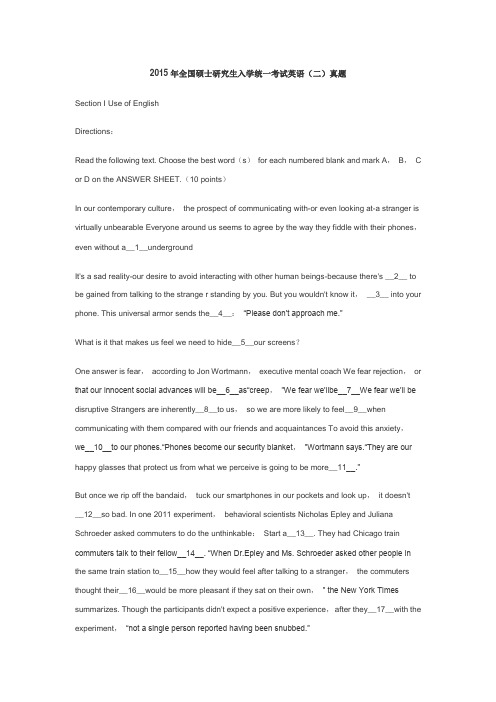
2015年全国硕士研究生入学统一考试英语(二)真题Section I Use of EnglishDirections:Read the following text. Choose the best word(s)for each numbered blank and mark A,B,C or D on the ANSWER SHEET.(10 points)In our contemporary culture,the prospect of communicating with-or even looking at-a stranger is virtually unbearable Everyone around us seems to agree by the way they fiddle with their phones,even without a__1__undergroundIt's a sad reality-our desire to avoid interacting with other human beings-because there's __2__ to be gained from talking to the strange r standing by you. But you wouldn't know it,__3__ into your phone. This universal armor sends the__4__:“Please don't approach me.”What is it that makes us feel we need to hide__5__our screens?One answer is fear,according to Jon Wortmann,executive mental coach We fear rejection,or that our innocent social advances will be__6__as“creep,”We fear we'llbe__7__We fear we'll be disruptive Strangers are inherently__8__to us,so we are more likely to feel__9__when communicating with them compared with our friends and acquaintances To avoid this anxiety,we__10__to our phones.“Phones become our security blanket,”Wortmann says.“They are our happy glasses that protect us from what we perceive is going to be more__11__.”But once we rip off the bandaid,tuck our smartphones in our pockets and look up,it doesn't__12__so bad. In one 2011 experiment,behavioral scientists Nicholas Epley and Juliana Schroeder asked commuters to do the unthinkable:Start a__13__. They had Chicago train commuters talk to their fellow__14__. “When Dr.Epley and Ms. Schroeder asked other people in the same train station to__15__how they would feel after talking to a stranger,the commuters thought their__16__would be more pleasant if they sat on their own,” the New York Times summarizes. Though the participants didn't expect a positive experience,after they__17__with the experiment,“not a single person reported having been snubbed.”__18__,these commutes were reportedly more enjoyable compared with those sans communication,which makes absolute sense,__19__human beings thrive off of social connections. It's that__20__:Talking to strangers can make you feel connected.1. [A] ticket [B] permit [C]signal [D] record2. [A] nothing [B] link [C]another [D] much3. [A] beaten [B] guided [C]plugged [D] brought4. [A] message [B] cede [C]notice [D] sign5. [A] under [B] beyond [C] behind [D] from6. [A] misinterpreted [B] misapplied [C] misadjusted [D] mismatched7. [A] fired [B] judged [C] replaced [D] delayed8. [A] unreasonable [B] ungrateful [C] unconventional [D] unfamiliar9. [A] comfortable [B] anxious [C] confident [D] angry10. [A] attend [B] point [C] take [D] turn11. [A] dangerous [B] mysterious [C] violent [D] boring12. [A] hurt [B] resist [C] bend [D] decay13. [A] lecture [B] conversation [C] debate [D] negotiation14. [A] trainees [B] employees [C] researchers [D] passengers15. [A] reveal [B] choose [C] predict [D] design16. [A] voyage [B] flight [C] walk [D] ride17. [A] went through [B] did away [C] caught up [D] put up18. [A] In turn [B] In particular [C]In fact [D] In consequence19. [A] unless [B] since [C] if [D] whereas20. [A] funny [B] simple [C] logical [D] rare【参考答案】CDCAC ABDBD AABDC DACBB【试题点评】完型填空为了测试考生实际应用英语的能力和语感。
2015考研英语 完形填空攻略详解

资料来源:中国教育在线 /资料来源:中国教育在线 / 经过前面的讲解,相信大家对2015考研英语完形填空题有了更深一步地了解,包括对词汇的认识、语篇结构的把握等。
一篇完形的讲解不希望是就题论题,希望大家对这一类题能够有所把握。
今天老师就完形填空这一题型向考生做攻略详解。
由于多数考生把完形放到最后来做,好多同学的做题策略就是靠蒙,其实“蒙”也有科学的“蒙”法。
完形中正确选项是有一定分布规律的,首先ABCD 在20个空中是均匀分布,每项出现大概4-6个,比如2014年中,ABCD 各出现了5个;另外连续相同的3个选项是不会出现的,连续相同的2个选项出现0-3个,其余都是连续不相同的选项一般是17-20个。
2014年中,5、6题都是A ,18、19题都是C ,其余都是不相同。
但在强化阶段,一定不建议大家这样做,就像何凯文老师说的那样,侥幸的成功有时比失败更可怕,大家要做的就是踏踏实实做题,把基础夯实,认真对待做对的或做错的每一道题目。
对于完形填空的做题步骤,考生们可以这样,首先一定要精读首段首句,首句是文章的主题或主旨,大概了解主旨后我们可以粗略推出文章的内容,这对我们做下边的题目也有很大的帮助;其次浏览一下每段的第一句话,大概知道文章整个内容;再次进行最重要的详读阶段,读句子和选项,如果某个选项不会的话,就跳过去接着做,后文的内容会对前边的内容有帮助;最后如果有时间的话要全文校对一遍,在这一遍过程中可能会发现一些错误。
最后告诉大家一定要摆脱“完形填空难”的意识,因为从完形填空词汇上来说,是由 85%的四级词汇和高中词汇、10%的六级词汇、5%的考研词汇组成,这样大家在阅读文章的时候不会感觉很难;从句子层面来看,长难句不像阅读理解中的语法那么难以分析,完形中主要考察的是语篇层面,要学会瞻前顾后,注意前后句子的联系,有时候答案就在空的前后两句甚至三句中。
此外,完形还考察对词汇深度的理解,在记忆词汇量的基础上,考生要着重记忆重点词汇多个意义的理解和记忆。
2015年考研英语一真题及答案:完形填空
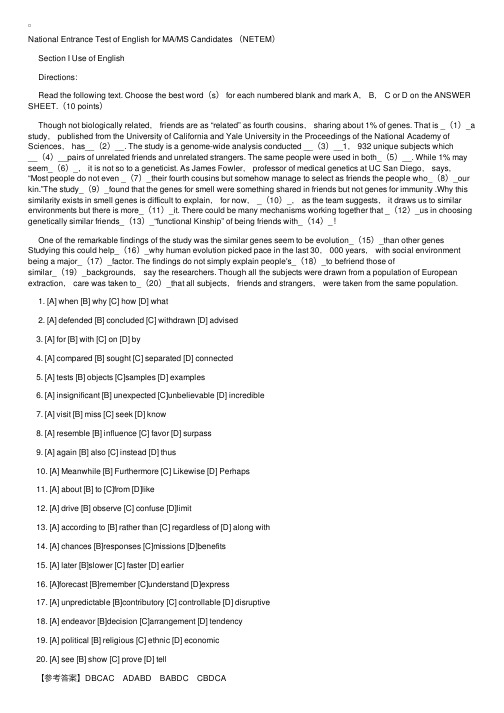
National Entrance Test of English for MA/MS Candidates (NETEM) Section I Use of English Directions: Read the following text. Choose the best word(s) for each numbered blank and mark A, B, C or D on the ANSWER SHEET.(10 points) Though not biologically related, friends are as “related” as fourth cousins, sharing about 1% of genes. That is _(1)_a study, published from the University of California and Yale University in the Proceedings of the National Academy of Sciences, has__(2)__. The study is a genome-wide analysis conducted __(3)__1, 932 unique subjects which__(4)__pairs of unrelated friends and unrelated strangers. The same people were used in both_(5)__. While 1% may seem_(6)_, it is not so to a geneticist. As James Fowler, professor of medical genetics at UC San Diego, says,“Most people do not even _(7)_their fourth cousins but somehow manage to select as friends the people who_(8)_our kin.”The study_(9)_found that the genes for smell were something shared in friends but not genes for immunity .Why this similarity exists in smell genes is difficult to explain, for now, _(10)_, as the team suggests, it draws us to similar environments but there is more_(11)_it. There could be many mechanisms working together that _(12)_us in choosing genetically similar friends_(13)_“functional Kinship” of being friends with_(14)_! One of the remarkable findings of the study was the similar genes seem to be evolution_(15)_than other genes Studying this could help_(16)_why human evolution picked pace in the last 30, 000 years, with social environment being a major_(17)_factor. The findings do not simply explain people's_(18)_to befriend those ofsimilar_(19)_backgrounds, say the researchers. Though all the subjects were drawn from a population of European extraction, care was taken to_(20)_that all subjects, friends and strangers, were taken from the same population. 1. [A] when [B] why [C] how [D] what 2. [A] defended [B] concluded [C] withdrawn [D] advised 3. [A] for [B] with [C] on [D] by 4. [A] compared [B] sought [C] separated [D] connected 5. [A] tests [B] objects [C]samples [D] examples 6. [A] insignificant [B] unexpected [C]unbelievable [D] incredible 7. [A] visit [B] miss [C] seek [D] know 8. [A] resemble [B] influence [C] favor [D] surpass 9. [A] again [B] also [C] instead [D] thus 10. [A] Meanwhile [B] Furthermore [C] Likewise [D] Perhaps 11. [A] about [B] to [C]from [D]like 12. [A] drive [B] observe [C] confuse [D]limit 13. [A] according to [B] rather than [C] regardless of [D] along with 14. [A] chances [B]responses [C]missions [D]benefits 15. [A] later [B]slower [C] faster [D] earlier 16. [A]forecast [B]remember [C]understand [D]express 17. [A] unpredictable [B]contributory [C] controllable [D] disruptive 18. [A] endeavor [B]decision [C]arrangement [D] tendency 19. [A] political [B] religious [C] ethnic [D] economic 20. [A] see [B] show [C] prove [D] tell 【参考答案】DBCAC ADABD BABDC CBDCA 【试题点评】完型填空为了测试考⽣实际应⽤英语的能⼒和语感。
2015考研英语名师真题透析
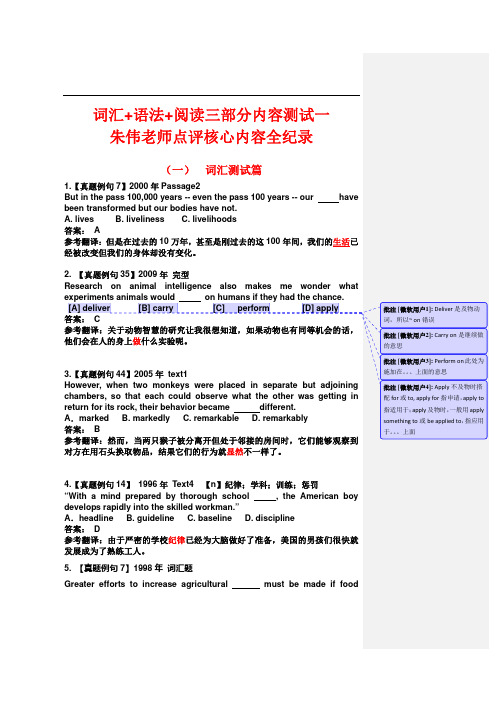
批注 [微软用户1]: Deliver 是及物动 词,所以~ on 错误
批注 [微软用户2]: Carry on 是继续做 的意思
批注 [微软用户3]: Perform on 此处为 施加在。。。上面的意思
批注 [微软用户4]: Apply 不及物时搭 配 for 或 to, apply for 指申请,apply to 指适用于;apply 及物时,一般用 apply something to 或 be applied to,指应用 于。。。上面
(二) 语法测试篇
请翻译下面 5 句话:
1. 定语从句 1) 前置定语从句——信息量小 (2003/61) Furthermore, humans have the ability to modify the environment in which they live, thus subjecting all other life forms to their own peculiar ideas and fancies. 参考翻译:而且,人类有能力改变他们生活的环境,从而使所有其他的生命形式服从于 人类自己特有的思想和喜好。
参考翻译:在和他们的接触中,我们很容易忽视自己行为对于他们性情的影响,但是在 和成人打交道的过程中却没有这么容易忽视。
3. 动词时态和被动语态 (2007/46)Traditionally, legal learning has been viewed in such institutions as the special preserve of lawyers, rather than a necessary part of the intellectual equipment of an educated person. 参考翻译:传统意义上,法律学习已经被这些机构视为律师的专属,而不是受教育者文 化知识积累的必须部分。
2015年考研英语真题及解析
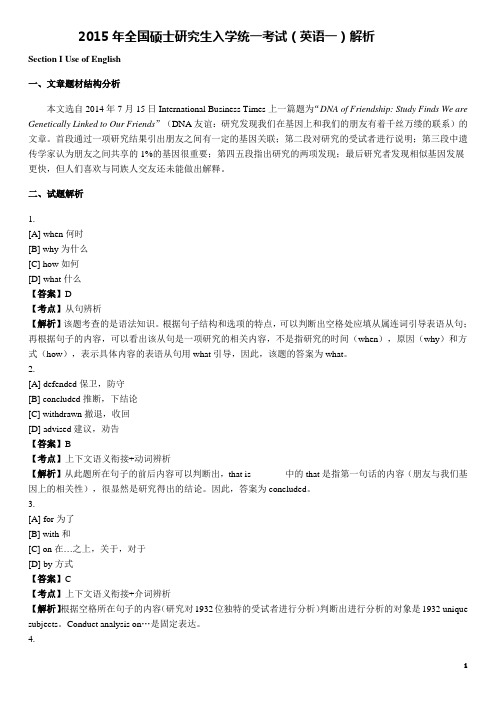
2015年全国硕士研究生入学统一考试(英语一)解析Section I Use of English一、文章题材结构分析本文选自2014年7月15日International Business Times上一篇题为“DNA of Friendship: Study Finds We are Genetically Linked to Our Friends”(DNA友谊:研究发现我们在基因上和我们的朋友有着千丝万缕的联系)的文章。
首段通过一项研究结果引出朋友之间有一定的基因关联;第二段对研究的受试者进行说明;第三段中遗传学家认为朋友之间共享的1%的基因很重要;第四五段指出研究的两项发现;最后研究者发现相似基因发展更快,但人们喜欢与同族人交友还未能做出解释。
二、试题解析1.[A] when 何时[B] why 为什么[C] how 如何[D] what 什么【答案】D【考点】从句辨析【解析】该题考查的是语法知识。
根据句子结构和选项的特点,可以判断出空格处应填从属连词引导表语从句;再根据句子的内容,可以看出该从句是一项研究的相关内容,不是指研究的时间(when),原因(why)和方式(how),表示具体内容的表语从句用what引导,因此,该题的答案为what。
2.[A] defended 保卫,防守[B] concluded 推断,下结论[C] withdrawn 撤退,收回[D] advised 建议,劝告【答案】B【考点】上下文语义衔接+动词辨析【解析】从此题所在句子的前后内容可以判断出,that is_______ 中的that是指第一句话的内容(朋友与我们基因上的相关性),很显然是研究得出的结论。
因此,答案为concluded。
3.[A] for为了[B] with和[C] on在…之上,关于,对于[D] by方式【答案】C【考点】上下文语义衔接+介词辨析【解析】根据空格所在句子的内容(研究对1932位独特的受试者进行分析)判断出进行分析的对象是1932 unique subjects。
2015年考研英语一完形精读
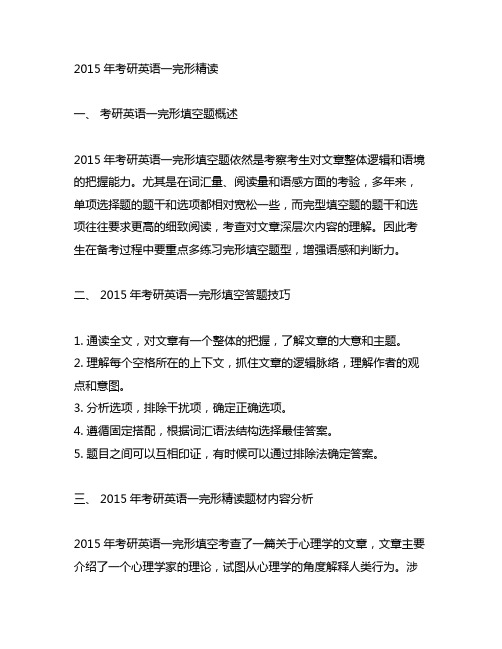
2015年考研英语一完形精读一、考研英语一完形填空题概述2015年考研英语一完形填空题依然是考察考生对文章整体逻辑和语境的把握能力。
尤其是在词汇量、阅读量和语感方面的考验,多年来,单项选择题的题干和选项都相对宽松一些,而完型填空题的题干和选项往往要求更高的细致阅读,考查对文章深层次内容的理解。
因此考生在备考过程中要重点多练习完形填空题型,增强语感和判断力。
二、 2015年考研英语一完形填空答题技巧1. 通读全文,对文章有一个整体的把握,了解文章的大意和主题。
2. 理解每个空格所在的上下文,抓住文章的逻辑脉络,理解作者的观点和意图。
3. 分析选项,排除干扰项,确定正确选项。
4. 遵循固定搭配,根据词汇语法结构选择最佳答案。
5. 题目之间可以互相印证,有时候可以通过排除法确定答案。
三、 2015年考研英语一完形精读题材内容分析2015年考研英语一完形填空考查了一篇关于心理学的文章,文章主要介绍了一个心理学家的理论,试图从心理学的角度解释人类行为。
涉及了人类的进化心理学、心理学的研究方法和临床心理学等方面的内容,文章较为专业,需要考生具有一定的文化底蕴和知识储备。
四、 2015年考研英语一完形填空备考方法1. 阅读专业的心理学书籍,了解对应领域的专业术语和理论知识。
2. 利用考研英语一专业课辅导资料,针对性的进行练习和训练,拓展词汇量和阅读量。
3. 多看心理学相关的文章,增强对专业内容的理解和把握。
4. 注重平时积累,提高对生词和固定搭配的掌握程度。
五、 2015年考研英语一完形填空阅读策略1. 注重整体把握,第一遍阅读时不用停顿,了解文章的主题和脉络。
2. 第二遍阅读时,注重空格所在的上下文和语境,理解每个空格的词义和句意。
3. 注意排除干扰项,不能被表面的语言现象所迷惑,要注重深层次的理解。
4. 学会灵活应对,做到眼到、手停,排除干扰项,确定最佳答案。
六、结语通过对2015年考研英语一完形填空题的分析,可以得出以下结论:完形填空题的考查点主要在于考察考生对文章整体逻辑和语境的把握能力,需要考生具有较强的阅读理解能力和一定的文化底蕴和知识储备。
2015年英语(二)完型点评:难度略降

2015年英语(二)完型点评:难度略降2015考研笔试已经结束。
整体来看,命题形式常规,未曾出现很大的波折,难度略为降低。
下面点评下今年英语(二)的完型考题。
2015年考研英语(二)完型填空选自美国当今最具影响力新闻博客网站《赫芬顿邮报》(The Huffington Post)在2014年5月16日发布的一篇博文,原文题目为“This Is Why You Ignore Everybody On The Subway -- And Why You ShouldStop”,原文篇幅很长,共计17段,本次英语二考试只选取了前七段。
完型的题型大致可以分为几类:词义题、逻辑题、搭配题。
下面结合2015年英语(二)的完形填空的选项,分析总结三种完形填空题型。
1.词义题主要是对实义词的考查,同时又结合了近义词辨析或者形近词辨析。
解题时不仅要注意词义辨析,更要注意和文章主旨保持一致。
如真题中第11题,A选项dangerous(危险的),B选项mysterious(神秘的),C选项violent(暴力的),D选项boring(无聊的)。
四个词为实词辨析,根据前文出现的uneasiness(不安);security(安全),可得知A选项dangerous与之形成呼应。
此外,13题的各个选项虽然不是形近,但含义都有些相近,如lecture演讲,conversation谈话,debate辩论,negotiation协商。
这就需要大家结合语境来解题,看上下文的背景信息。
解答这类题目时,不仅要考虑文章的中心主线,还要考虑各词本身的功能或特点,并且要了解褒贬一致、语气一致等原则。
2.逻辑题语篇中的逻辑衔接是指句子之间或句子内部各成分之间,通过连接性词语的运用,实现语义上的连贯。
逻辑衔接反映在考题上主要是选择逻辑连接词:包括反映句际逻辑关系的连接词、介词、短语等。
英语知识运用的逻辑关系主要包括:并列、递进、因果、对立、总分以及条件关系等。
攻克 2015 考研英语之完形填空
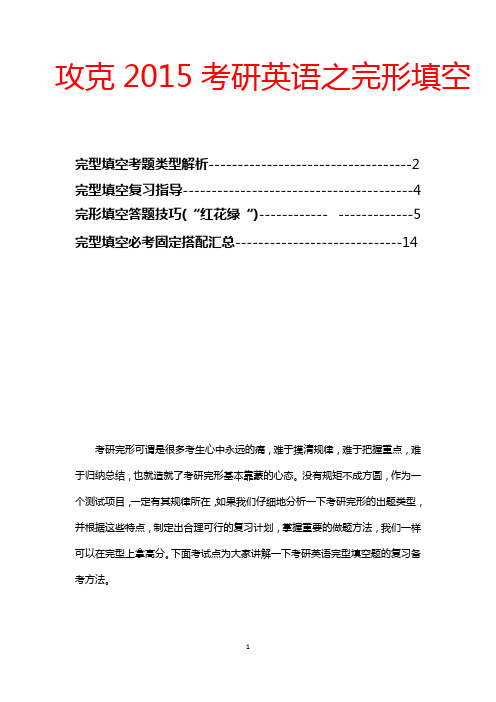
攻克2015考研英语之完形填空完型填空考题类型解析-----------------------------------2完型填空复习指导----------------------------------------4完形填空答题技巧(“红花绿“)-------------------------5完型填空必考固定搭配汇总-----------------------------14考研完形可谓是很多考生心中永远的痛,难于摸清规律,难于把握重点,难于归纳总结,也就造就了考研完形基本靠蒙的心态。
没有规矩不成方圆,作为一个测试项目,一定有其规律所在,如果我们仔细地分析一下考研完形的出题类型,并根据这些特点,制定出合理可行的复习计划,掌握重要的做题方法,我们一样可以在完型上拿高分。
下面考试点为大家讲解一下考研英语完型填空题的复习备考方法。
完型填空考题类型解析完型填空一定要注重思路和寻找线索能力的训练,做题的基本思路是,根据已知信息去填空,根据空前后的线索来选择填什么。
比方说,题目让考生填主句的内容,那么从句中就会有相应的说明。
题目让考生填动词,原文常常在别的地方出现这个动词的同义词。
那么如何判断呢?首先根据需要填写动词后面出现的宾语,找到有同一宾语的句子,该句中的动词就是所需填写词的同义词。
常见搭配、固定词组常常作为完型填空的考点。
如果题目让你填单词,常常与搭配有关系,在平时就应该有意识地积累一些固定词组和搭配,这样,在考试时,就能节省很多时间,并且记忆搭配、词组等还有利于作文的写作等很多方面,所以为了很好地应付这些题型,要在平时准备过程中多下工夫,多积累。
另外,在平常练习中,学生做题要张弛有度,把握时间,速度要快。
不用把文章全部细读一遍,可针对考点做题。
注意每段话的首句,完型填空20道题目尽量控制在20分钟内做完。
考生对不同语境中规范的语言要素(包括词汇、表达方式和结构)的掌握程度,而且还考查考生对语段特征(如连贯性和一致性等);的辨识能力等。
2015考研英语真题讲解
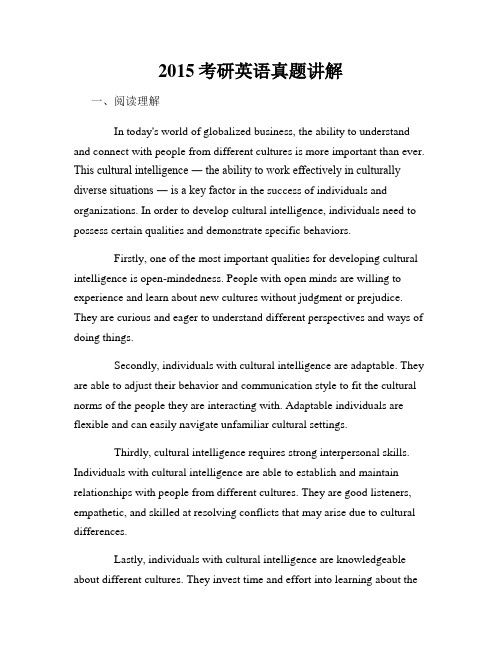
2015考研英语真题讲解一、阅读理解In today's world of globalized business, the ability to understand and connect with people from different cultures is more important than ever. This cultural intelligence ― the ability to work effectively in culturally diverse situations ― is a key facto r in the success of individuals and organizations. In order to develop cultural intelligence, individuals need to possess certain qualities and demonstrate specific behaviors.Firstly, one of the most important qualities for developing cultural intelligence is open-mindedness. People with open minds are willing to experience and learn about new cultures without judgment or prejudice. They are curious and eager to understand different perspectives and ways of doing things.Secondly, individuals with cultural intelligence are adaptable. They are able to adjust their behavior and communication style to fit the cultural norms of the people they are interacting with. Adaptable individuals are flexible and can easily navigate unfamiliar cultural settings.Thirdly, cultural intelligence requires strong interpersonal skills. Individuals with cultural intelligence are able to establish and maintain relationships with people from different cultures. They are good listeners, empathetic, and skilled at resolving conflicts that may arise due to cultural differences.Lastly, individuals with cultural intelligence are knowledgeable about different cultures. They invest time and effort into learning about thehistory, customs, and social norms of different cultures. This knowledge allows them to understand and appreciate the values and beliefs of people from different backgrounds.In conclusion, developing cultural intelligence is essential for success in today's globalized world. Open-mindedness, adaptability, interpersonal skills, and cultural knowledge are all qualities and behaviors that contribute to cultural intelligence. By cultivating these qualities and demonstrating these behaviors, individuals can enhance their ability to connect with people from different cultures and effectively navigate culturally diverse situations.二、翻译在全球化业务的今天,理解和与来自不同文化背景的人建立联系的能力比以往任何时候都更加重要。
2015年研究生考试考研英语一真题试题分析

2015年研究生考试考研英语一真题试题分析2015考研英语一真题总体介绍:较2014年考研英语一真题来说,2015年整体难度持平,整体的感觉就是看似简单的词汇却是理解原文信息的关键。
话题涉及人际关系类、政治类、科技信息类、人文类等。
阅读第二篇文章涉及隐私话题,手机信息是否可以被保护。
2007年text 4是也涉及隐私的话题,主要讨论的是数据泄露问题。
阅读第三篇是关于报刊杂志的发展。
阅读第四篇是关于新闻评论的文章。
而本次阅读涉及的相关话题,我们在以前的真题中也出现了类似的话题。
比如2014年text 3、2010年text 1都是关于报刊新闻类话题的文章。
作文部分出现了和2009年的真题作文同类的话题,都是交流类的,强调人们在享受现代科技带来的便利的同时,不能忽视现实交流的重要性。
在此,考研1号老师提醒广大考生,注重基础,重视真题,亲动笔,常练习,这样才能在考试中取得理想的成绩。
完型原文标题:DNA of Friendship: Study Finds We are Genetically Linked to Our Friends (DNA友谊:研究发现我们在基因上和我们的朋友有着千丝万缕的联系)。
作者:Jayalakshmi K时间:July 15, 2014外刊:外文网站Givology小结:此网站是由沃顿商学院的一群学生建立的,旨在为发展中国家的奖学金和教育项目募集资金。
主要受益群体是需要资助的大学生,所以在大学生群体颇受欢迎,也是广大大学生群里非常喜爱的一个交流的网站。
命题人员选取这类型网站的题源,是真正在测试大家日常所学习的知识。
此次选题告诉我们要在日常学习英语中,不能仅仅局限于最熟悉的那些期刊,要和世界接轨,让语言真正实现无国界的交流与思想沟通。
解题关键:1. 语法题。
答案为what2. 前后信息判断。
答案为concluded3. 固定表达。
conduct analysis on...4. 定语从句限定关系。
2015考研英语一、二新题型及完型深度解析
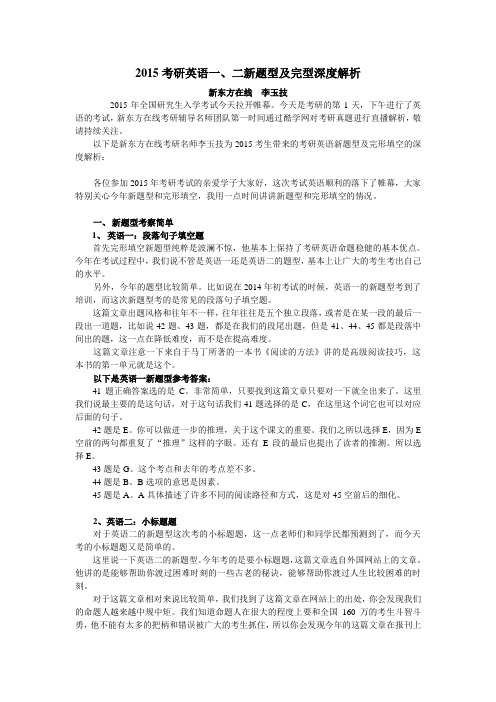
2015考研英语一、二新题型及完型深度解析新东方在线李玉技2015年全国研究生入学考试今天拉开帷幕。
今天是考研的第1天,下午进行了英语的考试,新东方在线考研辅导名师团队第一时间通过酷学网对考研真题进行直播解析,敬请持续关注。
以下是新东方在线考研名师李玉技为2015考生带来的考研英语新题型及完形填空的深度解析:各位参加2015年考研考试的亲爱学子大家好,这次考试英语顺利的落下了帷幕,大家特别关心今年新题型和完形填空,我用一点时间讲讲新题型和完形填空的情况。
一、新题型考察简单1、英语一:段落句子填空题首先完形填空新题型纯粹是波澜不惊,他基本上保持了考研英语命题稳健的基本优点。
今年在考试过程中,我们说不管是英语一还是英语二的题型,基本上让广大的考生考出自己的水平。
另外,今年的题型比较简单。
比如说在2014年初考试的时候,英语一的新题型考到了培训,而这次新题型考的是常见的段落句子填空题。
这篇文章出题风格和往年不一样,往年往往是五个独立段落,或者是在某一段的最后一段出一道题,比如说42题、43题,都是在我们的段尾出题,但是41、44、45都是段落中间出的题,这一点在降低难度,而不是在提高难度。
这篇文章注意一下来自于马丁所著的一本书《阅读的方法》讲的是高级阅读技巧,这本书的第一单元就是这个。
以下是英语一新题型参考答案:41题正确答案选的是C。
非常简单,只要找到这篇文章只要对一下就全出来了。
这里我们说最主要的是这句话,对于这句话我们41题选择的是C,在这里这个词它也可以对应后面的句子。
42题是E。
你可以做进一步的推理,关于这个课文的重要。
我们之所以选择E,因为E 空前的两句都重复了“推理”这样的字眼。
还有E段的最后也提出了读者的推测。
所以选择E。
43题是G。
这个考点和去年的考点差不多。
44题是B。
B选项的意思是因素。
45题是A。
A具体描述了许多不同的阅读路径和方式,这是对45空前后的细化。
2、英语二:小标题题对于英语二的新题型这次考的小标题题,这一点老师们和同学民都预测到了,而今天考的小标题题又是简单的。
2015考研英语二完型真题解析
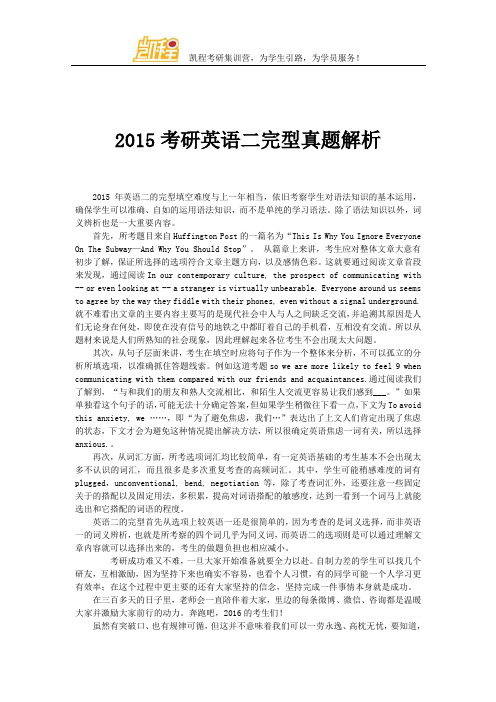
2015考研英语二完型真题解析2015年英语二的完型填空难度与上一年相当,依旧考察学生对语法知识的基本运用,确保学生可以准确、自如的运用语法知识,而不是单纯的学习语法。
除了语法知识以外,词义辨析也是一大重要内容。
首先,所考题目来自Huffington Post的一篇名为“This Is Why You Ignore Everyone On The Subway—And Why You Should Stop”。
从篇章上来讲,考生应对整体文章大意有初步了解,保证所选择的选项符合文章主题方向,以及感情色彩。
这就要通过阅读文章首段来发现,通过阅读In our contemporary culture, the prospect of communicating with -- or even looking at -- a stranger is virtually unbearable. Everyone around us seems to agree by the way they fiddle with their phones, even without a signal underground.就不难看出文章的主要内容主要写的是现代社会中人与人之间缺乏交流,并追溯其原因是人们无论身在何处,即使在没有信号的地铁之中都盯着自己的手机看,互相没有交流。
所以从题材来说是人们所熟知的社会现象,因此理解起来各位考生不会出现太大问题。
其次,从句子层面来讲,考生在填空时应将句子作为一个整体来分析,不可以孤立的分析所填选项,以准确抓住答题线索。
例如这道考题so we are more likely to feel 9 when communicating with them compared with our friends and acquaintances.通过阅读我们了解到,“与和我们的朋友和熟人交流相比,和陌生人交流更容易让我们感到___。
考研英语二历年真题2015解析

2015年全国硕士研究生入学统一考试英语(二)试题详解Section I Use of English本文是一篇论说性文章,选自The Huffington Post(《赫芬顿邮报》)2014年5月发表的文章This Is Why You Ignore Everybody On The Subway—And Why You Should Stop,探讨现代社会人们避免与陌生人沟通的现象以及产生该现象的原因。
本文描述了当代社会“人们不愿与陌生人交流”的现象,分析了原因,用实验举例说明与人交流可以让我们获益很多。
第一段提出问题:现代人热衷于玩手机,而不愿与陌生人交流。
第二段阐明观点:与陌生人交流有很多益处,可人们忽略了这些益处。
第三段过渡,提出问题:人们为什么不愿意与陌生人交流?第四、五段解释人们不愿意与陌生人交流的原因。
第六段举例论证与陌生人交流不是那么可怕的事情。
第七段进一步阐述与陌生人交流可以让人愉悦,并得出结论:与陌生人交流会让你感觉到自己与别人息息相关。
Para.1①In our contemporary culture, the prospect of communicating with—or even looking at—a stranger is virtually unbearable. ②Everyone around us seems to agree by the way they cling to their phones, even without a 1 on a subway.译 文①在我们当代的文化中,与陌生人交流——甚至是看陌生人一眼都是令人难以忍受的。
②我们身边每个人好像都同意这个观点,他们一直玩手机,哪怕是在没有信号的地铁里。
语篇分析首句点题,指出现代人对“与陌生人交流”这件事的态度。
第二句描述一个现象作为例证:人们宁愿在没有信号的地铁里一直玩手机,也不愿与陌生人交流,以此证明首句的观点。
15年考研英语二真题
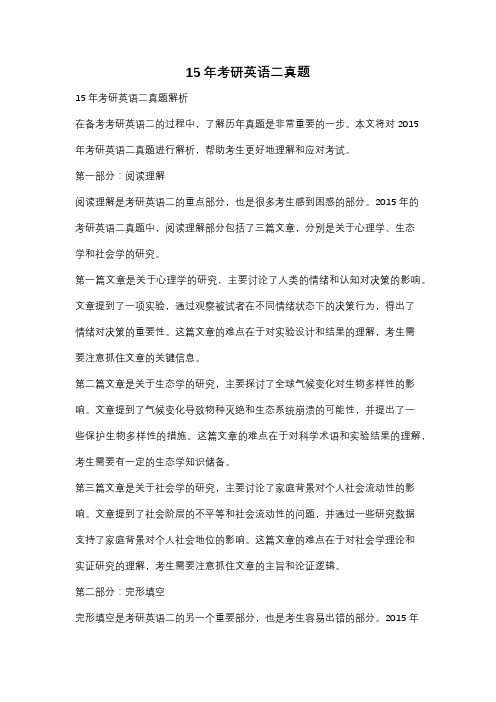
15年考研英语二真题15年考研英语二真题解析在备考考研英语二的过程中,了解历年真题是非常重要的一步。
本文将对2015年考研英语二真题进行解析,帮助考生更好地理解和应对考试。
第一部分:阅读理解阅读理解是考研英语二的重点部分,也是很多考生感到困惑的部分。
2015年的考研英语二真题中,阅读理解部分包括了三篇文章,分别是关于心理学、生态学和社会学的研究。
第一篇文章是关于心理学的研究,主要讨论了人类的情绪和认知对决策的影响。
文章提到了一项实验,通过观察被试者在不同情绪状态下的决策行为,得出了情绪对决策的重要性。
这篇文章的难点在于对实验设计和结果的理解,考生需要注意抓住文章的关键信息。
第二篇文章是关于生态学的研究,主要探讨了全球气候变化对生物多样性的影响。
文章提到了气候变化导致物种灭绝和生态系统崩溃的可能性,并提出了一些保护生物多样性的措施。
这篇文章的难点在于对科学术语和实验结果的理解,考生需要有一定的生态学知识储备。
第三篇文章是关于社会学的研究,主要讨论了家庭背景对个人社会流动性的影响。
文章提到了社会阶层的不平等和社会流动性的问题,并通过一些研究数据支持了家庭背景对个人社会地位的影响。
这篇文章的难点在于对社会学理论和实证研究的理解,考生需要注意抓住文章的主旨和论证逻辑。
第二部分:完形填空完形填空是考研英语二的另一个重要部分,也是考生容易出错的部分。
2015年的考研英语二真题中,完形填空部分是一篇关于地球资源利用的文章。
这篇文章主要讨论了地球资源的有限性和人类对地球资源的过度开发的问题。
文章提到了一些环保组织和科学家的观点,呼吁人们采取可持续发展的方式利用地球资源。
这篇文章的难点在于对科学术语和逻辑关系的理解,考生需要注意抓住文章的主旨和论证逻辑。
第三部分:翻译翻译是考研英语二的最后一部分,也是考生需要熟悉的部分。
2015年的考研英语二真题中,翻译部分包括了一篇英译汉和一篇汉译英。
英译汉部分是一篇关于科技创新的文章,主要讨论了科技创新对经济发展的重要性。
2015年考研英语(一)深度解析:完型
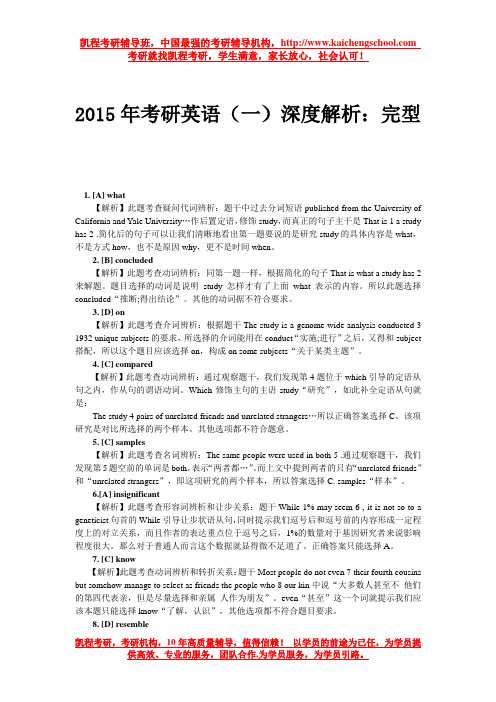
2015年考研英语(一)深度解析:完型1. [A] what【解析】此题考查疑问代词辨析:题干中过去分词短语published from the University of California and Yale University…作后置定语,修饰study,而真正的句子主干是That is 1 a study has 2 .简化后的句子可以让我们清晰地看出第一题要说的是研究study的具体内容是what,不是方式how,也不是原因why,更不是时间when。
2. [B] concluded【解析】此题考查动词辨析:同第一题一样,根据简化的句子That is what a study has 2 来解题。
题目选择的动词是说明study怎样才有了上面what表示的内容。
所以此题选择concluded“推断;得出结论”。
其他的动词据不符合要求。
3. [D] on【解析】此题考查介词辨析:根据题干The study is a genome-wide analysis conducted 3 1932 unique subjects的要求,所选择的介词能用在conduct“实施;进行”之后,又得和subject 搭配,所以这个题目应该选择on,构成on some subjects“关于某类主题”。
4. [C] compared【解析】此题考查动词辨析:通过观察题干,我们发现第4题位于which引导的定语从句之内,作从句的谓语动词。
Which修饰主句的主语study“研究”,如此补全定语从句就是:The study 4 pairs of unrelated friends and unrelated strangers…所以正确答案选择C。
该项研究是对比所选择的两个样本。
其他选项都不符合题意。
5. [C] samples【解析】此题考查名词辨析:The same people were used in both 5 .通过观察题干,我们发现第5题空前的单词是both,表示“两者都…”。
15年英语考研真题答案

15年英语考研真题答案(一)2015年英语考研真题共有三篇阅读理解,分别是A、B、C三篇,总共有18个问题。
下面将逐一解答这些问题,并附上详细的解析。
1. A篇主要讨论了什么主题?题目要求找出A篇的主题。
通过仔细阅读A篇的内容,可以发现其主题为“环境保护与可持续发展”。
2. A篇的作者对环境保护的态度是什么?我们需要从A篇中找到作者对环境保护的态度。
根据文中的描述,作者对环境保护持积极支持的态度。
3. 作者提到了哪些环境方面的问题?这道题要求列举出作者在文章中提到的环境问题。
在A篇中,作者提到了气候变化、水资源短缺以及能源消耗等方面的问题。
4. B篇主要讨论了什么主题?和第一题类似,我们需要找出B篇的主题。
通读B篇的内容后,可以发现其主题为“全球经济发展与贸易”。
5. B篇的观点与第一题中的A篇观点相同吗?这道题要求比较A篇和B篇作者对环境保护的观点是否相同。
通过对比两篇文章的内容,可以发现虽然主题不同,但作者对环境保护持相似的积极态度。
6. 作者提到了哪些经济方面的问题?类似于第三题,这道题目要求列举出B篇中作者提到的经济问题。
在B篇中,作者提到了全球经济不平衡、贸易保护主义以及金融市场稳定性等方面的问题。
7. C篇主要讨论了什么主题?最后一篇文章C篇需要找出其主题。
通过阅读C篇的内容,可以看出其主题为“教育与技术发展”。
8. C篇的观点与前两篇文章相比有何不同?这道题要求比较C篇与前两篇文章的观点是否存在不同之处。
通过阅读三篇文章的内容,我们可以发现C篇与前两篇文章在主题和观点上有所不同,C篇更关注教育和技术的发展。
9. C篇提到了哪些教育方面的问题?与之前的题目类似,这道题要求列举出C篇中提到的教育问题。
通过阅读C篇内容,可以发现作者提到了教育不平等、技术教育以及教学方法等问题。
10. 与B篇相比,C篇的观点更接近那篇文章?这道题要求比较C篇与B篇的观点是否相近。
通过对比C篇和B篇的内容,可以发现两篇文章的观点在经济发展和技术创新方面存在相似之处。
- 1、下载文档前请自行甄别文档内容的完整性,平台不提供额外的编辑、内容补充、找答案等附加服务。
- 2、"仅部分预览"的文档,不可在线预览部分如存在完整性等问题,可反馈申请退款(可完整预览的文档不适用该条件!)。
- 3、如文档侵犯您的权益,请联系客服反馈,我们会尽快为您处理(人工客服工作时间:9:00-18:30)。
2015考研英语:完型真题内容浅析
1.完型简介
完型填空其实质就是一篇短小精悍的英语阅读,只不过将这篇阅读挖了20个空出来,每个空0.5分,共10分。
在阅读中,中心句一般出现在首位段或每段的首尾句。
完型既然类似于阅读,那也具有这样的特点。
所以,我们在做完型的时候要去精读第一句,而且第一句通常也不会挖空,有利于我们去理解主要内容。
完型的做题方式虽然有技巧可言,但文都英语老师还是希望小伙伴们可以在具有一定实力的基础上,再采用一些技巧,这样才能在考研英语完型中立于不败之地。
2.考试内容
考研完形填空考查的内容主要分为两部分:⑴词汇:主要指形近词及近义词的辨析和词汇搭配;⑵语法知识:包括逻辑关系和句子基本结构,也就是我们通常所说的并列、转折、强调、递进等逻辑关系,及句子的结构等。
下面我们以2001年的完型真题为例进行分析:Concerns were raised49witnesses might be encouraged to exaggerate their stories in court50guilty verdicts.
49.A.what B.when C.which D.that
50.A.assure B.confide C.ensure D.guarantee
这个题目中包含了两个知识点:即语法知识点和词汇知识点。
我们来仔细看下。
49题,concerns were raised,先看下四个选项what,when,which,that,这四个词都是从句的引导词,那这个横线处要填的肯定是个从句了。
Raise是个动词,raise出现了后面一定是个宾语从句吗?并不完全如此。
为什么?我们看到这个地方,这里were raised是个什么语态?被动语态。
Concerns were raised,concerns被提起来,被什么提起来呢?被人提起来。
那么如果把它变成主动就是people raised concerns,这个时候它已经不再是一个宾语从句了。
在被动语态下面是没有宾语从句的。
因此我们可以发现,在这里were raised对我们来说是没有用的,这个从句是和concerns有关的。
确切的说,这里的被动语态将concerns 和它的从句分割开来。
是concerns+引导词这样一个结构:People raised concerns (), concerns是个名词,和名词有关的从句有定语从句和同位语从句。
那到底是定语从句还是同位语从句呢?我们再来看它是一个什么样的结构。
主语witnesses,谓语might be encouraged,宾语to exaggerate their stories,这是完整的结构,包括主谓宾。
在干什么呢?在解释说明concerns是什么。
我们知道定语从句是修饰、限定名词范围的从句,同位语从句是解释、说明名词内容的从句。
同位语从句用引导词that引导,因此这个题选D.
我们再来看下第50题。
这是语法中的词汇辨析的部分。
大家可以发现 A.assure和C.ensure长的特别像,as-和en-开头都是动词,assure和ensure。
在完形填空中如果出现形近词时,正确答案一般都是在形近词中选择一个。
从字面意思来看,这里的assure,ensure 都是“保证”的意思,包括guarantee也是“保证”的意思,但是一般形近词出现,都是在形近词中选一个,也就是在A和C中选择一个。
这个题中,assure和ensure是形近,又是意近,更是我们考查的重点了。
但是这两个词该选哪一个呢?这里考查的词汇的搭配问题。
Assure后面往往跟的是“人”,assure somebody向某人保证,向某人确认;ensure通常
接something,保证某件事情。
如果我们了解了这些之后,我们会发现这个题就变得很简单了。
guilty verdicts有罪裁定,毋庸置疑,这是一个东西吧,既然是一个东西,那么这个地方就是选C吧。
其实这道题是一个典型的具有完型填空风格的题,在平时做题的时候,我们要去思考这道题想考的点是什么,我自己能不能把这个点提炼出来。
希望2015考研的同学好好准备,祝大家考研成功!
考研成功难又不难,一旦大家开始准备就要全力以赴。
自制力差的学生可以找几个研友,互相激励,因为坚持下来也确实不容易,也看个人习惯,有的同学可能一个人学习更有效率;在这个过程中更主要的还有大家坚持的信念,坚持完成一件事情本身就是成功。
在三百多天的日子里,老师会一直陪伴着大家,里边的每条微博、微信、咨询都是温暖大家并激励大家前行的动力。
奔跑吧,2016的考生们!
虽然有突破口、也有规律可循,但这并不意味着我们可以一劳永逸、高枕无忧,要知道,想要精通世界上任何一门语言,除非有天生的语言天分,否则偷不得半分懒,只能勤勤恳恳反复练习。
一遍不懂读两遍,默念不行就大声念出来,遇到不认识的单词就查,不懂的句子就静下心来拆分结构。
总之,读书百遍、其义自现,英语学习之路上没有笨蛋,只有懒人。
综上就是小编给大家提供的高分技巧,技巧就是牢固的知识点和强悍的答题思路,预祝所有考生2016考研有个好成绩。
凯程教育:
凯程考研成立于2005年,国内首家全日制集训机构考研,一直从事高端全日制辅导,由李海洋教授、张鑫教授、卢营教授、王洋教授、杨武金教授、张释然教授、索玉柱教授、方浩教授等一批高级考研教研队伍组成,为学员全程高质量授课、答疑、测试、督导、报考指导、方法指导、联系导师、复试等全方位的考研服务。
凯程考研的宗旨:让学习成为一种习惯;
凯程考研的价值观口号:凯旋归来,前程万里;
信念:让每个学员都有好最好的归宿;
使命:完善全新的教育模式,做中国最专业的考研辅导机构;
激情:永不言弃,乐观向上;
敬业:以专业的态度做非凡的事业;
服务:以学员的前途为已任,为学员提供高效、专业的服务,团队合作,为学员服务,为学员引路。
如何选择考研辅导班:
在考研准备的过程中,会遇到不少困难,尤其对于跨专业考生的专业课来说,通过报辅导班来弥补自己复习的不足,可以大大提高复习效率,节省复习时间,大家可以通过以下几个方面来考察辅导班,或许能帮你找到适合你的辅导班。
师资力量:师资力量是考察辅导班的首要因素,考生可以针对辅导名师的辅导年限、辅导经验、历年辅导效果、学员评价等因素进行综合评价,询问往届学长然后选择。
判断师资力量关键在于综合实力,因为任何一门课程,都不是由一、两个教师包到底的,是一批教师配合的结果。
还要深入了解教师的学术背景、资料著述成就、辅导成就等。
凯程考研名师云集,李海洋、张鑫教授、方浩教授、卢营教授、孙浩教授等一大批名师在凯程授课。
而有的机构只是很普通的老师授课,对知识点把握和命题方向,欠缺火候。
对该专业有辅导历史:必须对该专业深刻理解,才能深入辅导学员考取该校。
在考研辅导班中,从来见过如此辉煌的成绩:凯程教育拿下2015五道口金融学院状元,考取五道口15人,清华经管金融硕士10人,人大金融硕士15个,中财和贸大金融硕士合计20人,北师大教育学7人,会计硕士保录班考取30人,翻译硕士接近20人,中传状元王园璐、郑家威都是来自凯程,法学方面,凯程在人大、北大、贸大、政法、武汉大学、公安大学等院校斩获多个法学和法硕状元,更多专业成绩请查看凯程网站。
在凯程官方网站的光荣榜,成功学员经验谈视频特别多,都是凯程战绩的最好证明。
对于如此高的成绩,凯程集训营班主任邢老师说,凯程如此优异的成绩,是与我们凯程严格的管理,全方位的辅导是分不开的,很多学生本科都不是名校,某些学生来自二本三本甚至不知名的院校,还有很多是工作了多年才回来考的,大多数是跨专业考研,他们的难度大,竞争激烈,没有严格的训练和同学们的刻苦学习,是很难达到优异的成绩。
最好的办法是直接和凯程老师详细沟通一下就清楚了。
建校历史:机构成立的历史也是一个参考因素,历史越久,积累的人脉资源更多。
例如,凯程教育已经成立10年(2005年),一直以来专注于考研,成功率一直遥遥领先,同学们有兴趣可以联系一下他们在线老师或者电话。
有没有实体学校校区:有些机构比较小,就是一个在写字楼里上课,自习,这种环境是不太好的,一个优秀的机构必须是在教学环境,大学校园这样环境。
凯程有自己的学习校区,有吃住学一体化教学环境,独立卫浴、空调、暖气齐全,这也是一个考研机构实力的体现。
此外,最好还要看一下他们的营业执照。
